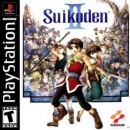irstupid said:
jammy2211 said:
lestatdark said:
jammy2211 said:
For me it's not that they're getting worse, just they're getting repetitive. I've been playing the things since the SNES days, and it just doesn't feel like the genre has come that far since then, unlike most other genres.
WRPG's for me have passed them nowadays, they just kept pushing the boundaries, going further, wanting to do more and more incredible things.... where JRPG's stalled or even went backwards lol.
Saying that, I've no idea where I want JRPG's to go... but I just want something to come along and be all different and awesome. |
Not that I disagree that most JRPG's have been getting stale, pretty much that's been happening since last gen.
But saying that WRPG's have evolved that much is a bit of an overstatement. What WRPG's have surpassed what Baldur's Gate or Planescape Torment achieved? Was Fallout 3 as good as the Black Isle Fallout's or was it an Oblivion with a Fallout skin? Why was Oblivion a step down in gameplay from Morrowind?
WRPG's haven't evolved all that much actually.
|
In all honesty it's because I haven't been playing WRPG's for as long as JRPG's so they just feel new.
Still, it feels like in terms of pushing technology and broadening their scope and ambition, WRPG's keep pushing to do more and more. I don't really have the experience of playing older ones except some Might and Magics and Baldur's Gate though. From back then though they've come a long just in how much freedom you now have to shape the story, react to characters etc.
|
freedom in the shape of the story? there is no freedom in shape of story even the best of games that supposed change on your actions its just a difference of kill the person or go through process of keeping him alive. in the end the result is hte same, you complete whatever quest you were there for and move on.
as for alternate endings, lol. there are like 2 usually at most. and they usually all boil down to only ONE DECISION in the entire game. usually its if you let this one person live or kill them. depending on your answer there the ending is changed. never understood the huge "OMG" about it, or the multlple choices you get. and it all done in conversation that are prebuilt in the system. that is not free will. you have two -4 choices of what to say at most to someone, that half the time make no sense to what you would say in that situation.
rpg's have been the same since the beginning, western and japanese. only thing changing is the graphics, battle systems, and more of an illusion of choice.
|
Both wrpgs and jrpgs don't compare to table-top rpgs in terms of role-playing. But the western crpg for the past 30+ years have strived towards trying to aim for the greatest role-playing experience possible for a software program. At the end of the day, it's just illusion of choice but at least they've tried really hard (but ultimately failing because a software program can't fully capture the human imagination) to try to reach the ideal. Even if the ideal is unattainable, theres nothing wrong with trying your best to get as close to that ideal as possible. For eg. No human is 100% Good but it's not wrong for humans to try to strive towards being as good as possible right? And while you may think, "but why settle for watered down role-playing when you can have the real thing?" you have to keep in mind that the vast majority of people are unwilling to organize pen n paper sessions anymore. For them, it's a lot more convenient to just get a western crpg and play those, which is pretty much the next best thing to an authentic role-playing experience.
In the west, CRPGs pretty much started with table-top rpgs (Dungeons & Dragons). So their goal is to strive towards that table-top ideal. In Japan, their CRPG heritage pretty much started with Wizardry (which influenced Dragon Quest, which in turn influenced Final Fantasy, etc). Wizardry was a dungeon crawler. So for them (aside from stuff like Shin Megami Tensei, which is kinda wrpg-esque in the way that they have a morality system, branching endings depending on your moral slant, etc.), they don't have the goal of trying to reach that table-top roleplaying ideal. They've branched off into their own direction.































